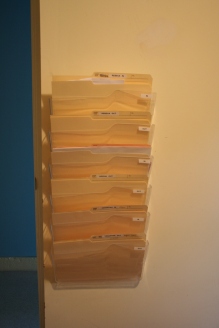It’s T minus 3 days till the beginning of school so it’s time to make sure that we have a better system in place for homework management. And here it is: inboxes and outboxes for both Sophia and I and also her little brother.
These things are called document holders and they come in packs of three and are stackable. They come with mounting hardware so you can mount them to a wall as we’ve done here. These are mounted just around the corner from our new entrance door where my spouse made us a very handy little mudroomish area with hooks and shelves. All this work in aid of helping Sophia and the rest of the family get organized!
I decided to get these specifically to address the problem of where completed homework belongs (in Sophia’s outbox) since it was such a problem for her last year, but I think these will come in extremely handy when dealing with all the dozens of forms the children bring home that I have to deal with and send back.
The new boxes make my spouse happy because we have no “reminders” on our fridge anymore (a practise that works pretty well for me but drives him nuts because of the cluttered fridge front). Also, the fact that the clear plastic wall-mounted boxes are frankly pretty ugly isn’t a concern because we’ve put them in the most infrequently-used and smallest room in the house.
So now we just have to form the habit of using the new entrance and new mudroom and the new inboxes and outboxes. Starting Tuesday.








